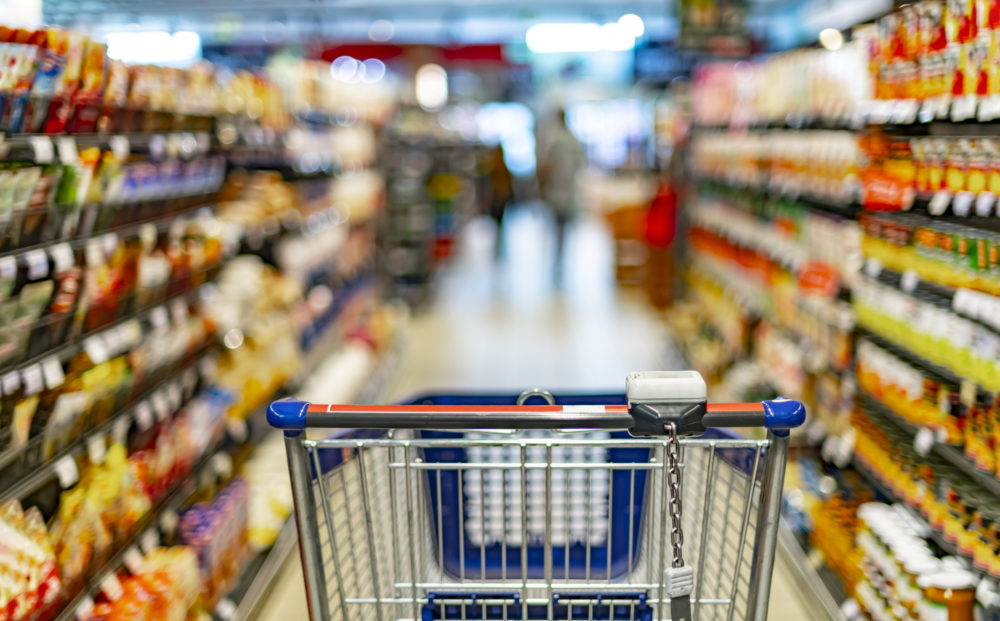People with coeliac disease paying up to 35% more for weekly food shop

Those with coeliac disease, a serious autoimmune condition with the only treatment being to follow a medically prescribed gluten free diet, are facing a huge additional burden in terms of the cost and availability of gluten free food in UK supermarkets.
An updated Coeliac UK report: The Gluten Free Diet: What does it cost and why does it matter? compares the prices of gluten free products and their gluten containing counterparts across major UK supermarkets.
It shows that people with coeliac disease are paying up to 35% more for a weekly food shop suitable for a gluten free diet and 7 in 10 people find shopping gluten free ‘adversely affects their quality of life’ due to cost and availability of gluten free food in supermarkets and online.
Because of the substantial cost of gluten free food, people with coeliac disease are opting to risk consuming gluten, potentially jeopardising their health as a result. 4% are actively eating gluten despite health risks due to cost concerns and nearly a third (27%) are opting to eat products with ‘may contain’ statements for the same reason.
Analysis
Coeliac UK found that 77% of people struggled to afford gluten free products. Analysing the average cost of gluten free food compared to gluten containing food gram for gram from March 2022 to March 2024, Coeliac UK found that:
- Bread loaves are 4.5 times more expensive.
- Plain flour is 2.0 times more expensive.
- Bread Rolls are 3.1 times more expensive.
- Pasta is 2.0 times more expensive.
- Crackers are 1.7 times more expensive.
- Cereals are 2.1 times more expensive.
Those on the lowest incomes are hit hardest by this additional cost. The cheapest gluten free loaf of bread is 6.1 times more expensive than the cheapest gluten containing loaf, gram for gram. Some have unfairly suggested people with coeliac disease should eat alternatives, however, eating rice or potatoes instead of bread can reduce iron and calcium intake by up to 96% and 93%. This is significant because people with coeliac disease are recommended to have a higher intake of calcium, due to previous or potential ongoing malabsorption.
While overall food inflation has reduced over the past two years, those with coeliac disease are still facing huge financial burden and issues with availability. The report reveals that gluten free bread has increased by almost 7p per 100g, while the gluten containing equivalent has increased by less than a penny per 100g between December 2022 and March 2024.

Nick Trott RD, Gastroenterology Dietitian, Royal Hallamshire Hospital & The University of Sheffield, said: “The findings from the Coeliac UK report highlight a critical concern: many patients struggle to afford the only effective treatment for their condition – a strict gluten free diet. Ensuring affordable access to gluten free foods is essential for the well-being of the coeliac community.”
Hannah Meakin works as a Specialist Audiologist in the NHS. Hannah often finds she is eating less food than she should be as she’s conscious not to overspend, and with the added pressure of the cost of living crisis, this has added to the challenges of needing to live gluten free.
Hannah said: “Whenever I do a food shop, there is a feeling of anxiety that I would have overspent on what I deem as basics for the week. As an NHS worker with demanding hours, I often need to have some gluten free food available for my short lunch breaks. This necessity can be challenging to fulfil both in terms of accessibility and affordability. Staples like gluten free bread are crucial for quickly assembling a nutritious meal, yet they are often hard to come by at a reasonable price. As a result, I sometimes end up with a less nutritious meal, which is far from ideal given the physical and mental demands of my job.”
Barriers
The Coeliac UK report also highlights the barriers of access and availability. Nearly 9 in 10 (87%) respondents described problems with overall availability of gluten free products, whilst 86% are unable to fulfil all their needs at one shop. When shopping online, for 1 out of 3 orders, gluten free bread loaves are out of stock.
Hannah English, 34, is mum to Harper, aged 5, who has coeliac disease. Adapting to a gluten free lifestyle for Harper has brought daily challenges. Hannah said: “On every shopping order, there will be items not available or unsuitable substitutions, so I will have to go to multiple shops to ensure that I have what my daughter needs for the week. There’s definitely a lack of choice of substitutions for gluten free foods in general.”
Kate Powell is a mum of two daughters with coeliac disease. She and her husband, Simon aged 39, both work full-time to financially support the family and fund a gluten free diet for them.
Kate said: “I never want my girls to feel like they are missing out, but availability and choice often means they can’t enjoy the same experiences as their friends. When we go out for day trips, we never feel comfortable that there will be gluten free food readily available. And the food that is available is always so much more expensive.”
Dr Gerry Robins, Consultant Gastroenterologist, York Hospital said: “Coeliac disease is not a diagnosis anyone would want even without the additional financial burden laid out in this report. As a clinician, I’m seeing more and more patients who simply cannot afford the gluten free staple foods they need to treat their condition. People have a right to high quality nutrition at reasonable prices – unfortunately significant numbers of coeliac patients are now being forced into a situation where they have to forgo the only treatment that makes them better (gluten free food) or go hungry. This is a significant public health issue and requires urgent action.”
One lifeline for those struggling with cost and availability is gluten free prescriptions. Certain gluten free staple substitutes have been made available on the NHS for decades, in recognition of the twin barriers of increased cost and limited availability of gluten free products. However, in recent years many Integrated Care Boards (ICBs) have opted to cut back on this much needed support, with gluten free prescriptions in England reducing by 70% since 2016.

While those living in Wales, Scotland and Northern Ireland can still access gluten free staples on prescription, in England it has become a postcode lottery. As of June 2024, roughly 50% of people in England live in an area that prescribes gluten free products compared to 80% less than a decade ago[2]. This has left far too many people cut adrift from this support at the very time they need it most.
“Lifeline”
One person who has benefitted, is Andrew Bloodworth who receives gluten free bread on repeat prescription.
Andrew said: “Being able to receive gluten free bread on prescription is a game changer. I can now spend more money on food for my children, as well as enjoy a more varied and balanced diet which is now strictly gluten free.
“It’s a relief no longer having to endure gut issues and it’s a weight off my shoulders having this support with food bills. The prescriptions have been a fantastic safety net and a way of sticking to a gluten free diet – I couldn’t imagine living without this lifeline.
“It’s been so important to me, and I’d never want to see anyone else needing to make the difficult decisions I had to make.”
While those with the condition living in Wales have some burden lifted, Kate Powell and her family used to access prescriptions but this was removed by the Hampshire and Isle of Wight Integrated Care Board at the start of 2024. The family are now facing an extra cost to their weekly shop.
Kate said: “Prescriptions were a vital lifeline before they were removed, and we’re now spending an extra £15 on average on our weekly shop because of it. We’ve tried to cut down on food like bread, but it’s still had a big impact on us as a family.”
The new findings are an update to a March 2023 report from Coeliac UK: The gluten free diet: How much does it cost and why does it matter? as part of its campaign to make gluten free food more affordable and accessible.
Coeliac UK is calling on the next UK Government to publish updated guidance for ICBs that reiterates the critical role of the gluten free diet in treating coeliac disease, and work with Coeliac UK and healthcare experts to develop and share best practice models for protecting access to gluten free prescriptions for those who need it. It is also asking the next UK Government to meet with patient representatives to understand their concerns and learn about the patient experience. To find out more about how to get involved and pledge your support visit: https://www.coeliac.org.uk/get-involved/campaign-with-us/cost-access-and-availability-of-gluten-free-food/
Coeliac UK is also inviting food industry partners who have yet to engage with the charity to join with them to further address the factors which make gluten free food more expensive.
Expense
Tristan Humphreys, Head of Advocacy at Coeliac UK, commented: “The reality for too many people across the UK with coeliac disease is that the food that keeps them well is too expensive and hard to access.
“This is bad news for the NHS that has to treat resultant health complications and devastating for the individuals impacted. The solution requires action from both Government and industry, and we hope that the stark realities laid out in this report, coupled with the welcome support from stakeholders, can prove a catalyst for meaningful change for the coeliac community across the UK.
“We would like to thank all those who have supported our campaign to date and encourage those inspired by this report to join us in helping to improve the lives of those with coeliac disease.
“In doing so, we can prevent this cost of living crisis becoming a health crisis.”
The full report can be downloaded here: https://www.coeliac.org.uk/2024-cost-of-living-report/
Support our Nation today
For the price of a cup of coffee a month you can help us create an independent, not-for-profit, national news service for the people of Wales, by the people of Wales.






